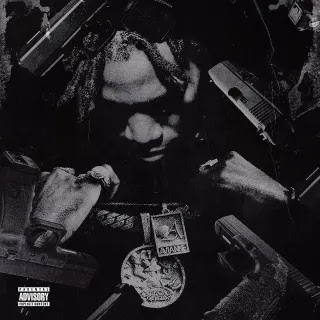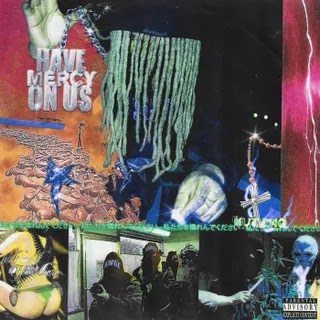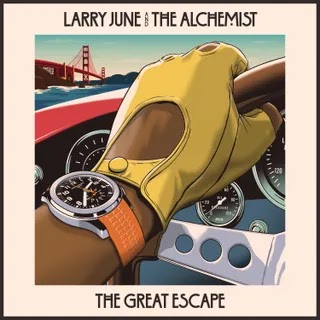The Baltimore rapper-producer’s sprawling project seesaws across genres, from emo rap to drum’n’bass to indie rock, with mad-scientist abandon.
There’s no point trying to classify Ghostie’s music. A Venn diagram of the Baltimore rapper-producer’s influences would look like a Rorschach test. It’s best described using signifiers: an infernal sludge, a stuffy studio apartment, a deep-fried meme that reveals more about humanity than any painting in a museum could. This is the work of an artist whose biggest stated inspiration is System of a Down, whose SoundCloud-based group Anti-World is credited with inventing something called Trap Metal and absolutely hates the distinction, whose daily life for the past presidential administration has consisted of nothing but furiously recording and absorbing music of all flavors like an overheating machine, input and output meters peaking well past the red.
This is also the work of a human: a father, a renter, a former alcoholic, a stressed and anxious city-dweller. Nowhere is that humanity more apparent than on his latest album Self Hate Wraith. Thanks to Ghostie’s improved writing and continued refinement of his wide-ranging palette, it’s his strongest release to date.
Ghostie is an outsider. He maintains an enigmatic presence—you’ll only find a few interviews with him online—and his music is noisy and challenging. But part of the thrill of his work comes from not knowing what the track playing through your headphones will sound like in the next 45 seconds. The loud, clipping choruses congeal into towering pop hooks that feel more in the spirit of Panic! At The Disco than anything from rap’s last decade (in “Eshuned,” one of the best moments on Self Hate Wraith, Ghostie indulgently interpolates “Lying Is the Most Fun a Girl Can Have Without Taking Her Clothes Off”). Ghostie is daring and unpredictable in the manner of his friend and collaborator JPEGMAFIA. Every album is overwhelming, every song is a calculated risk.
On Self Hate Wraith, he continues his scorched-earth campaign against rap norms. Drum’n’bass, synth pop, emo rap, and indie rock are among the countless genres he mines across these 24 self-produced songs. For the most part, this is experimentation done right; the genres all feel lived-in, not beamed in, and Ghostie’s production is top-flight. The album opens with a searing three-song run that quickly covers three genres while laying out the thesis. “Why must I try? Why must I work?” Ghostie croons on “Crazy,” a pounding pop rap track that splits the difference between WorkingOnDying and early-2010s Kid Cudi. The change-ups can be blinding, especially for listeners primed for traditional rap, but the longer you spend with them, the more they click into place.
Ghostie has grown into an impressive bluesman, flipping simple phrases into glowing screeds with his powerful, heavily processed vocals. He writes about the realities that millions of Americans face on a daily basis: feeling alone, fearing eviction, love and loss and drinking and dinner tonight. Listen to how he repeats a single line—“No matter how much hurt, sing your song you’ll be all right”—on “Shame,” turning it into a numbing chant you might hear during the graveyard shift on an asteroid mining plant. “Think Bout It All The Time” is another exercise in repetition, this time over four-on-the-floor synthpop: “I think ’bout it all the time, it won’t go away.” Ghostie’s writing has a strong populist streak: You don’t need to know what he’s thinking about to know that you’ve probably thought about it, too.
It’s the moments of catharsis that shine brightest. On the brash centerpiece of the album “Sizzle (I’m In Hell),” Ghostie growls something about oranges and potatoes from Blue’s Clues before delving into some of his most harrowing thoughts: isolation, getting kicked out on the 31st, guzzling whiskey and tequila and Sprite. Then another Blue’s Clues chorus, and then the second verse, a stumbling freestyle. It’s messy and brilliant, weirder and more honest than any of the rap music clogging Spotify’s paid-placement arteries.
The more traditional cuts like “Hard Soft Taco” and “Hatsu” pale in comparison to the experiments. They’re awkwardly sandwiched together in the tracklist, revealing a sequencing issue that turns the album bloated in the second half. But Ghostie records are sprawling by design, and you’re not here for a tightly wound opus. You’re here to put yourself in the hands of Baltimore’s premier mad scientist, and the payoffs are well worth the risks.
View the original article here
















0 comments:
Post a Comment